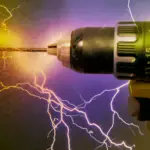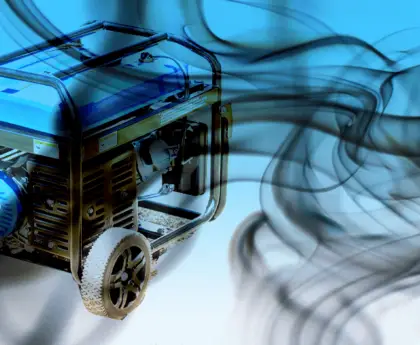Many homeowners wonder how they can keep their food cold during blackouts or outages, a situation where a generator for your refrigerator comes in handy. So, what do you look for in a generator for refrigerators?
Refrigerators consume between 100 and 800 amps every hour. A generator with a minimum of 2000 starting watts should adequately power the refrigerator without issues.
This guide is here to guide you on the right type of generator for your refrigerator, the proper sizing based on wattage requirements, installation steps, and maintenance.
Get ready to secure your food storage with generator for refrigerator guide!
Determining the Right Size Generator for Your Refrigerator
To determine the right size generator for your refrigerator, you need to consider various factors and understand the wattage requirements of different types of refrigerators.
Factors to consider when sizing a generator
First, consider the wattage requirements of your refrigerator. This determines if a generator has enough power to keep it running in case of an emergency. Any misjudgment may lead to damage from overload or inadequate power supply.
Next, think about the fuel type you prefer for your generator – gasoline, propane, natural gas, diesel or batteries all have their pros and cons. Evaluate how portable you need your generator to be because different models offer varying levels of portability based on size and weight.
Last but not least is budget; cost varies greatly among generators depending on size, brand and features such as dual fuel capabilities or solar charging options. Choose wisely! It’s also necessary to ensure proper installation and operation procedures are followed which contribute significantly towards safe usage over time.
Wattage requirements for different types of refrigerators
Different types of refrigerators have different wattage requirements, which determine the size of the generator needed to power them. Standard refrigerators and freezers typically require around 3,000 watts to run properly.
However, it’s important to check the specific watt consumption of your refrigerator model before choosing a generator. If the generator doesn’t provide enough wattage for your refrigerator, it could potentially cause damage.
So make sure to match the wattage requirements of your refrigerator with an appropriate generator model that can handle its power needs.
Generator Types for Powering a Refrigerator
There are several types of generators that can power a refrigerator, including gasoline, propane, natural gas, diesel, and battery generators.
Gasoline generators
Gasoline generators are a popular choice for powering refrigerators due to their affordability and availability. These generators typically have enough power to meet the wattage requirements of standard refrigerators and freezers.
However, it is important to ensure that the generator’s wattage matches or exceeds the refrigerator’s peak starting wattage and running wattage. It is also crucial to remember not to run a gasoline generator indoors, as it emits dangerous gases like carbon monoxide.
Instead, place the generator outdoors in a well-ventilated area away from open windows or doors before connecting it to your refrigerator.
Propane generators
Propane generators are a popular choice for powering refrigerators during power outages. They offer several advantages, including cleaner emissions and longer shelf life of the fuel compared to gasoline generators.
Propane is also readily available and can be stored in portable tanks, making it convenient for emergency situations. With the right size propane generator, you can ensure that your refrigerator operates smoothly and keeps your food fresh during an outage.
Natural gas generators
Natural gas generators are a popular choice for powering refrigerators during power outages. These generators run on natural gas, which is often readily available in homes that have a natural gas supply for heating or cooking.
Natural gas generators provide a reliable source of power and can be connected directly to the home’s natural gas line, eliminating the need to refuel with gasoline or propane. They are also known for their quieter operation compared to other generator types.
If you have access to natural gas and want a convenient and efficient option for keeping your refrigerator running, a natural gas generator may be the right choice for you.
Diesel generators
Diesel generators are a popular choice for powering refrigerators due to their efficiency and durability. These generators use diesel fuel to run, providing consistent power output.
They are known for their longevity and can handle heavy loads, making them suitable for running larger refrigerators or multiple appliances at the same time. With their robust construction, diesel generators can withstand extreme weather conditions, ensuring reliable operation during power outages.
They also tend to be more fuel-efficient compared to other generator types, allowing for longer runtime on a single tank of fuel.
Battery generators
Battery generators are a convenient option for powering refrigerators during a power outage. These portable generators use batteries as their source of energy, which means they don’t produce any emissions or noise.
They are also easy to maintain and operate. The wattage of the battery generator determines whether it can effectively power your refrigerator, so it’s important to consider the wattage requirements of your appliance when choosing a battery generator.
Linquip’s website provides valuable information about different battery generator models, helping you find the right one for your refrigerator needs.
Installing and Operating a Generator for Your Refrigerator
Consider the installation considerations for fuel-powered generators, such as proper ventilation and outdoor placement to prevent carbon monoxide build-up.
Installation considerations for fuel-powered generators
When installing a fuel-powered generator for your refrigerator, there are a few important factors to consider. First and foremost, ensure that the generator is installed outside or in a well-ventilated area to prevent any carbon monoxide build-up.
This is crucial for the safety of you and your household members. Additionally, it’s important to choose an appropriate location that provides easy access for refueling and maintenance.
Make sure there is enough space around the generator for proper airflow to avoid overheating. Lastly, consult with a professional electrician to ensure proper wiring and installation according to local building codes and regulations.
During installation, keep in mind that different types of fuel-powered generators may have specific requirements or considerations. Gasoline generators require safe storage of fuel and regular maintenance checks on the engine, while propane generators need adequate ventilation due to their emissions during operation.
Diesel generators may require additional equipment such as transfer switches or automatic start systems, so it’s essential to plan accordingly.
Installation considerations for battery generators
Installing a battery generator for your refrigerator requires careful consideration. First and foremost, make sure you have a suitable location that is well-ventilated to prevent the build-up of heat.
Battery generators should be placed in an area where they are protected from extreme temperatures and moisture. Additionally, ensure that you have enough space for the generator and any necessary wiring connections.
It’s also important to follow the manufacturer’s instructions carefully when installing a battery generator to ensure proper operation and safety.
Proper operation and maintenance of the generator
To ensure the proper operation and maintenance of the generator, it is essential to follow a few important steps. Firstly, always place the generator outside in a well-ventilated area to prevent any harmful gases from entering your living space.
Secondly, regularly check and change the oil as recommended by the manufacturer to keep the generator running smoothly. Additionally, clean or replace air filters regularly to maintain optimal performance.
Lastly, be sure to run the generator for a short period every month to prevent any fuel from becoming stale and clogging up the system. With these simple maintenance practices in place, your generator will continue to provide reliable power for your refrigerator when you need it most.
Generator For Refrigerator FAQs
Can a generator power a refrigerator?
Yes, a generator can power a refrigerator as long as the generator has enough wattage to meet the fridge’s energy requirements.
What size generator do I need for my refrigerator?
The size of the generator you need for your refrigerator depends on its wattage rating. Typically, a 2000-3000-watt generator is sufficient for most standard-sized refrigerators.
How long will a generator run my refrigerator?
The runtime of a generator powering a refrigerator depends on factors such as the capacity of the fuel tank and the load placed on the generator. Generally, generators can run refrigerators for several hours to days, depending on their fuel capacity.
Can I connect my refrigerator directly to a portable generator during an outage?
Yes, if you have the appropriate transfer switch or outlet installed by an electrician, you can safely connect your refrigerator directly to a portable generator during power outages without risking damage to either device.
Conclusion: Generator For Refrigerator
Simply put, choosing the right generator for your refrigerator is crucial to ensure proper power supply during an outage. Consider factors such as wattage requirements and generator types like gasoline or propane.
Installation and maintenance are vital for safe operation. Hopefully this guide helps you make an informed decision for your refrigerator backup power needs.






